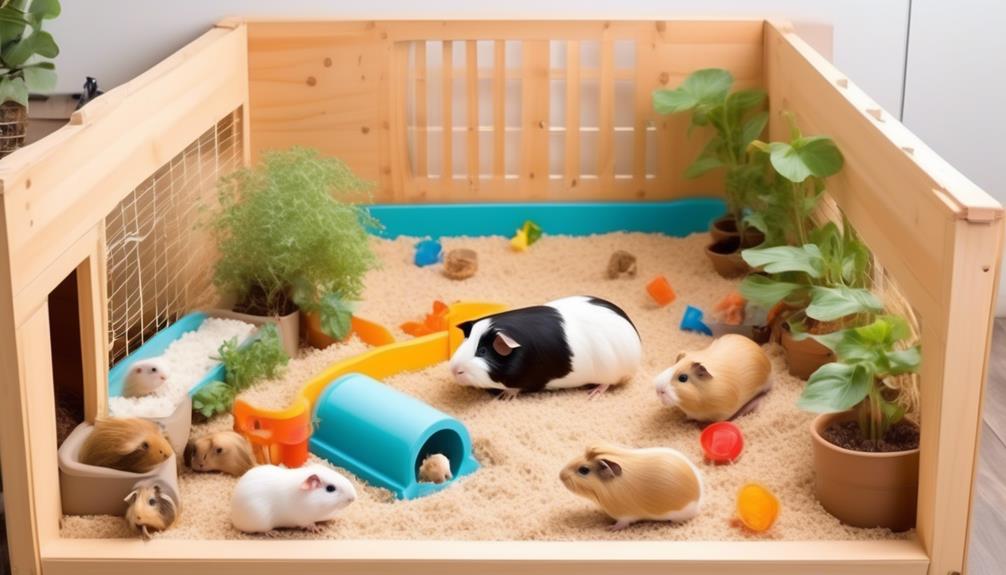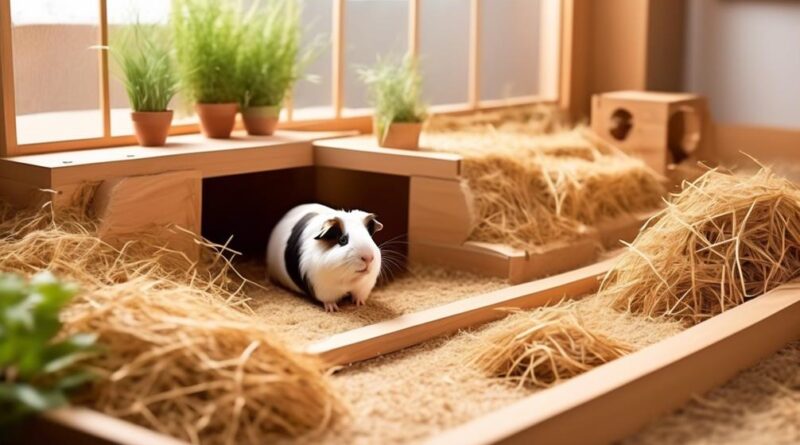Why Is a Comfortable Guinea Pig Habitat Essential?
When it comes to providing a comfortable habitat for your guinea pig, proper cage size, bedding options, food and water access, enrichment and toys, temperature and ventilation, hideouts and shelter, cleaning and maintenance, as well as socialization and interaction are all essential factors to consider.
Ensuring that your guinea pig has a suitable living environment is crucial for their overall well-being, but have you ever wondered why it's so important?
There are specific reasons why a comfortable habitat is not just a luxury, but a necessity for your furry friend.
Proper Cage Size
You should ensure that your guinea pig's cage is spacious enough to accommodate their need for exercise and exploration, as well as providing separate areas for feeding, sleeping, and bathroom activities. When considering the cage flooring, opt for a solid surface to prevent any foot injuries.
As for space requirements, the minimum cage size for one guinea pig should be about 7.5 square feet, but providing more space is always better for their well-being. A larger cage allows for more room to move around, exercise, and exhibit natural behaviors.
To meet your guinea pig's space needs, consider a cage with a solid bottom to avoid any foot or leg injuries. Wire flooring should be avoided as it can be uncomfortable and lead to foot problems. To ensure a comfortable habitat, cover the cage floor with materials like fleece, towels, or commercial cage liners.
In addition to the cage size, it's essential to provide enough room for accessories such as a hideout, food dishes, water bottles, and a litter box. These items shouldn't cramp the space inside the cage, allowing your guinea pig to move freely.
Bedding Options
Considering the importance of a comfortable habitat for your guinea pig, the choice of bedding options plays a crucial role in maintaining their overall well-being and health. When selecting bedding for your guinea pig's habitat, it's important to consider the health benefits and safety concerns associated with different options.
Bedding materials such as aspen shavings, paper-based bedding, or fleece liners are popular choices due to their low dust content, which can help prevent respiratory issues in guinea pigs. Additionally, these options are comfortable for your pet to walk and lay on, supporting their foot health.
Odor control is another important factor to consider when choosing bedding for your guinea pig's habitat. Some bedding materials, like paper-based options, are designed to absorb and control odors effectively, keeping the environment fresh and pleasant for both you and your pet. It's crucial to regularly clean and change the bedding to maintain a hygienic living space for your guinea pig.
Environmental impact is also a consideration when it comes to bedding options for your guinea pig. Some bedding materials, such as fleece liners, are reusable and can reduce the amount of waste generated. On the other hand, materials like cedar and pine shavings can have a negative impact on the environment and may pose health risks to your guinea pig due to the natural oils and aromatic compounds they contain.
Food and Water Access
To ensure easy access to food and water for your guinea pig, place the feeding and water containers in a convenient location within their habitat. This will ensure that your pet can easily find and reach their sustenance, supporting their feeding schedule and hydration needs.
Here's how you can optimize food and water access within your guinea pig's habitat:
- Feeding Schedule and Nutritional Balance
Set a consistent feeding schedule for your guinea pig, offering fresh vegetables, high-quality pellets, and Timothy hay daily. This will help maintain their nutritional balance and support their overall health and well-being.
- Water Bottle Placement and Hydration Needs
Position the water bottle within easy reach of your guinea pig, ensuring that it's securely attached to the habitat to prevent spills. Regularly check and refill the water bottle to meet your pet's hydration needs, keeping it clean and free of any blockages.
Enrichment and Toys
Enrich your guinea pig's habitat with a variety of toys and activities to promote mental stimulation and physical exercise. Behavioral stimulation is crucial for your guinea pig's mental health. Providing a stimulating environment can prevent boredom and the development of negative behaviors. Introducing different toys such as tunnels, balls, and chew toys can encourage natural behaviors and keep your guinea pig engaged. Rotate the toys regularly to maintain interest and provide a dynamic environment.
Exercise is essential for your guinea pig's overall wellbeing. Create a designated play area outside the cage where your guinea pig can explore and exercise. This can be achieved through the use of playpens or secure, supervised free-roaming time. Additionally, providing a variety of safe items to climb on, such as ramps and platforms, can help promote physical activity. Utilize safe, chewable materials and avoid anything with sharp edges or small parts that could be ingested.
Regular playtime outside the cage also allows for social interaction and bonding between you and your guinea pig. Engaging in interactive play with your pet, such as using a feather wand or teaching simple tricks, can provide mental enrichment and strengthen the human-animal bond. Remember to always supervise playtime and ensure that the environment is safe and free from potential hazards.
Temperature and Ventilation
Maintaining the appropriate temperature and ensuring proper ventilation in your guinea pig's habitat are crucial for their health and comfort. When it comes to temperature and ventilation, several key factors play a significant role in creating an ideal environment for your furry friend:
- Proper insulation: This ensures that the habitat retains heat during colder months and stays cool during warmer months, creating a comfortable and stable environment for your guinea pig.
- Air circulation: Good air circulation helps in regulating the temperature and preventing the buildup of stale air, promoting a fresh and healthy living space for your guinea pig.
In addition to these factors, aspects such as humidity control, natural light, and temperature regulation also contribute to your guinea pig's overall well-being. It's crucial to maintain a proper ventilation system and regularly clean the habitat to ensure that your pet has access to fresh air at all times. Providing proper bedding, an adequately sized cage, and easy access to food and water are also essential in creating a comfortable living space for your guinea pig. Furthermore, incorporating enrichment toys, hideouts for shelter, and opportunities for socialization and interaction will contribute to their mental and emotional well-being.
Ensuring that the habitat is well-maintained with a focus on cleanliness and providing a comfortable and stimulating environment will help keep your guinea pig healthy and content.
Hideouts and Shelter
After ensuring proper insulation and air circulation for your guinea pig's habitat, providing suitable hideouts and shelter becomes essential for their sense of security and well-being. Cozy hideouts are important for guinea pigs as they provide a safe space for them to retreat to when they feel stressed or threatened. These can include enclosed spaces such as igloos, tunnels, or small huts made of safe materials like wood or plastic. Ensure that the hideouts are appropriately sized for your guinea pig and placed in different areas of their habitat to give them options for privacy.
In addition to cozy hideouts, secure shelter is crucial to protect your guinea pig from potential dangers. This can be in the form of a sturdy cage or enclosure that's escape-proof and predator-resistant. Make sure the shelter is also well-ventilated and provides ample protection from extreme temperatures, drafts, and direct sunlight. It's important to regularly inspect the shelter for any signs of wear or damage and promptly make any necessary repairs or replacements to maintain its safety and security.
Cleaning and Maintenance

Regular cleaning and maintenance of your guinea pig's habitat is essential to ensure a healthy and hygienic living environment for your pet. To maintain a clean and pleasant habitat for your guinea pig, consider the following:
- Odor control and waste management
- Regularly remove any uneaten food, soiled bedding, and droppings from the cage to prevent the buildup of odors and bacteria.
- Replace soiled bedding with fresh, clean bedding to keep the cage smelling fresh and to provide a comfortable environment for your guinea pig.
- Cage layout and organization
- Clean and disinfect the cage and all accessories on a regular basis to prevent the accumulation of bacteria and germs.
- Arrange the cage layout to make cleaning and maintenance easier, ensuring that food and water dishes are easily accessible for refilling and cleaning.
Socialization and Interaction
To ensure your guinea pig's well-being, it's important to provide opportunities for socialization and interaction with both you and other guinea pigs. Playtime activities are essential for bonding with your guinea pig. Set aside time each day to interact with your guinea pig outside of their habitat. Allow them to explore a safe, enclosed area and engage in gentle play. This can include using tunnels, hideouts, and toys to encourage activity and mental stimulation. Engaging in these activities will help your guinea pig feel more comfortable and secure around you.
Bonding with other guinea pigs is also crucial for their social development. If you have more than one guinea pig, ensure that they have enough space to interact with each other. Pay attention to behavior cues and ensure that the interactions are positive. It's important to monitor their interactions to prevent any aggressive behavior. Additionally, if you're introducing a new guinea pig to your existing pet, proper handling and introduction techniques are crucial to ensure a smooth and stress-free integration.
When handling your guinea pig, it's important to be gentle and calm. Use slow movements and speak softly to help them feel at ease. Regular, gentle handling will help your guinea pig become more comfortable with human interaction and build trust. By providing opportunities for socialization and interaction, you're contributing to your guinea pig's overall well-being and happiness.
Frequently Asked Questions
How Can I Train My Guinea Pig to Use a Litter Box?
To potty train your guinea pig, start with behavior modification. Place the litter box in a convenient spot and use positive reinforcement. Ensure the cage setup encourages potty training by providing a comfortable and spacious habitat with a designated potty area.
Can Guinea Pigs Be Allergic to Certain Types of Bedding?
Yes, guinea pigs can be allergic to certain types of bedding. It's essential to observe any allergic reactions when introducing new bedding options. Straw, hay, and paper-based bedding are good alternatives. Monitor your guinea pig's health closely.
What Are Some Safe and Enjoyable Enrichment Activities for Guinea Pigs?
To keep your guinea pig happy and stimulated, consider making DIY toys and setting up foraging activities. These will provide mental and physical enrichment for your pet, ensuring they stay healthy and content in their habitat.
Are There Any Specific Temperature Ranges That Guinea Pigs Prefer?
In a comfortable habitat, guinea pigs prefer temperatures between 65-75°F. They adapt their behavior to stay cool or warm, so ensure their environment is snug and cozy. Providing a comfortable space supports their well-being and happiness.
How Can I Encourage Socialization Between My Guinea Pig and Other Household Pets?
To encourage socialization between your guinea pig and other household pets, start by introducing them in a controlled environment. Create a pet-friendly habitat for guinea pigs and dogs, ensuring safety and supervision during interactions.
Conclusion
In conclusion, creating a comfortable habitat for your guinea pig is essential for their overall well-being and happiness.
By providing a proper cage size, suitable bedding, access to food and water, enrichment and toys, appropriate temperature and ventilation, hideouts and shelter, regular cleaning and maintenance, and opportunities for socialization and interaction, you can ensure that your guinea pig has a safe and comfortable living environment.
This will ultimately contribute to their health and quality of life.
